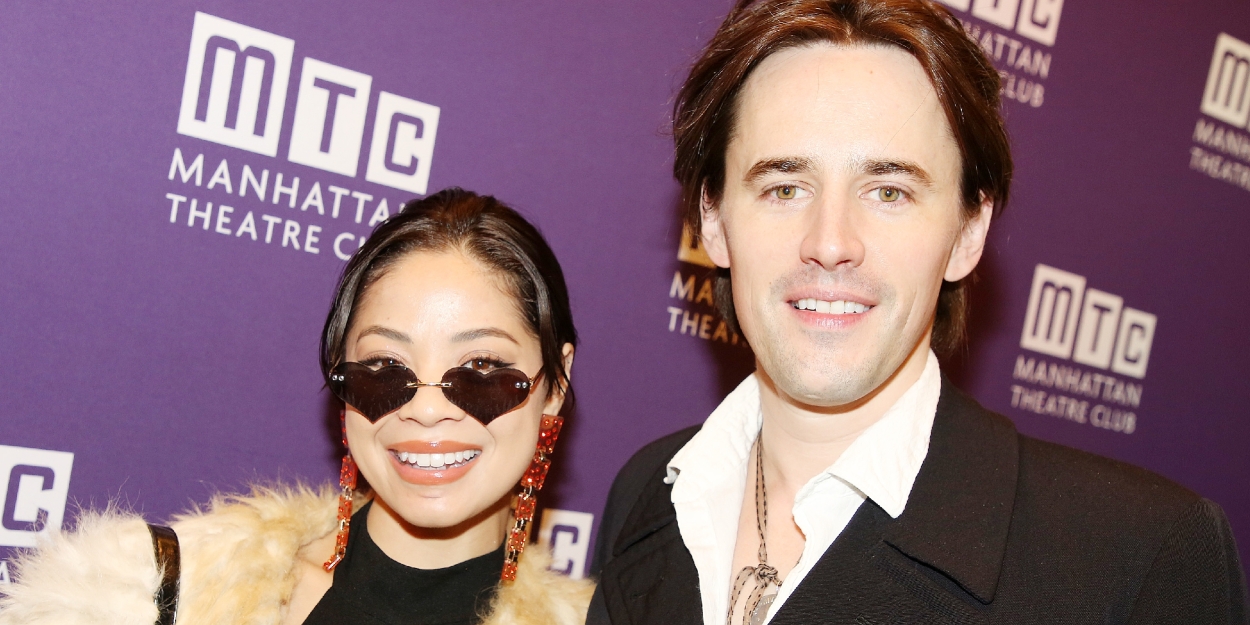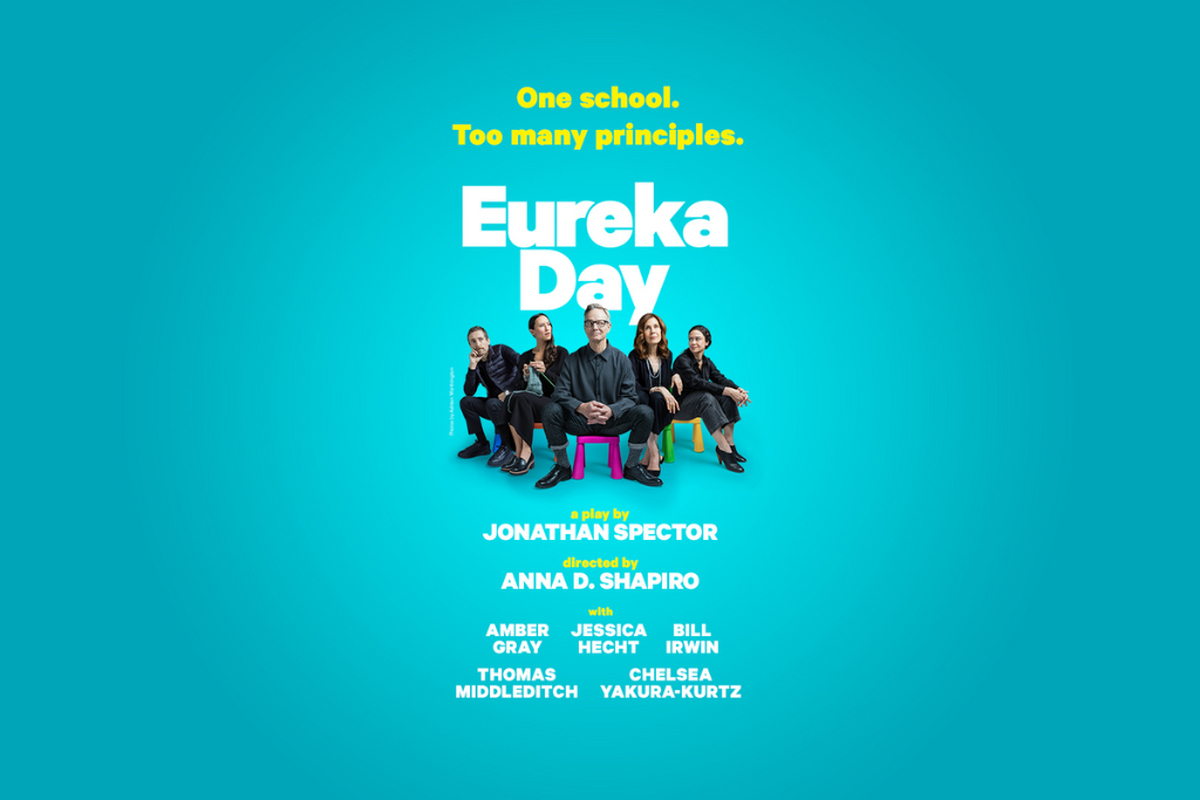Review Roundup: EUREKA DAY Opens On Broadway
Eureka Day is a timely new comedy from playwright Jonathan Spector,
The Broadway premiere of Eureka Day, a new comedy from playwright Jonathan Spector that takes audiences inside the hotly contested vaccine debte, celebrates its opening night tonight in a new production from Anna D. Shapiro!
The timely new work, presented by Manhattan Theater Club, is led on Broadwat by Tony Award nominee Amber Gray, two-time Tony Award nominee Jessica Hecht, Tony Award winner Bill Irwin, Emmy Award nominee Thomas Middleditch, and Chelsea Yakura-Kurtz. Read the reviews!
Jonathan Spector’s explosive and timely comedy had its world premiere at Aurora Theatre Company in Berkeley, CA., and has been seen Off-Broadway at Colt Coeur and in London at The Old Vic.
Eureka Day is a private California elementary school with a Board of Directors that values inclusion above all else—that is until an outbreak of the mumps forces everyone in the community to reconsider the school’s liberal vaccine policy. As cases rise, the board realizes with horror that they’ve got to do what they swore they never would: make a choice that won’t please absolutely everybody.
The production features: scenic design by Tony Award winner Todd Rosenthal; costume design by Tony Award winner Clint Ramos; lighting design by two-time Tony Award nominee Jen Schriever; original music and sound design by Drama Desk Award nominees Rob Milburn & Michael Bodeen; projection design by Tony Award nominee David Bengali; intimacy & sensitivity coordinator Ann C. James; vocal coach Gigi Buffington; casting by Caparelliotis Casting & Kelly Gillespie; Production Stage Manager Kevin Bertolacci.
![]() Jesse Green, The New York Times: *CRITIC'S PICK* That the intimate downtown version, directed by Adrienne Campbell-Holt, instead ended softly did not make the play less incisive. But Shapiro’s production has been majorly and satisfyingly scaled up for Broadway. The library is much bigger and brighter (sets by Todd Rosenthal, lights by Jen Schriever); the costumes (by Clint Ramos) telegraphic in their sociology and the bassoon-heavy interstitial music (by Rob Milburn and Michael Bodeen) almost cartoonishly apt. The cast, too, hits the sweet spot between broad and deep, with Irwin, a clown by training, especially good at fatuousness, and Hecht at steely ditziness. In a slightly underwritten role, Gray beautifully counters the others with sly wit.
Jesse Green, The New York Times: *CRITIC'S PICK* That the intimate downtown version, directed by Adrienne Campbell-Holt, instead ended softly did not make the play less incisive. But Shapiro’s production has been majorly and satisfyingly scaled up for Broadway. The library is much bigger and brighter (sets by Todd Rosenthal, lights by Jen Schriever); the costumes (by Clint Ramos) telegraphic in their sociology and the bassoon-heavy interstitial music (by Rob Milburn and Michael Bodeen) almost cartoonishly apt. The cast, too, hits the sweet spot between broad and deep, with Irwin, a clown by training, especially good at fatuousness, and Hecht at steely ditziness. In a slightly underwritten role, Gray beautifully counters the others with sly wit.
![]() Sara Holdren, Vulture: Hecht and Gray are excellent here and throughout, as is Shapiro’s whole company. They’re not clowning — though there’s a delightful wink of a moment in which Irwin’s Don waxes misty-eyed over the “actually quite subtle” mime work of a former colleague. Rather, they’re performing that crucial aspect of theater, its function as a space of civic practice, quite literally a place where we rehearse the hardest conversations, where we experiment with how to put together a community. In his script’s epigraph, Spector quotes from Eula Bliss’s On Immunity, where Bliss herself cites a doctor who describes a certain vaccine as “important … from a public health standpoint” but “not as critical from an individual point of view.” “In order for this to make sense,” writes Bliss, “one must believe that individuals are not part of the public.” It’s this cognitive dissonance, so widespread and so clamorous and so tragically American, that theater, by its very nature, is always addressing, and in Eureka Day that essential refutation takes on explicit and eloquent form.
Sara Holdren, Vulture: Hecht and Gray are excellent here and throughout, as is Shapiro’s whole company. They’re not clowning — though there’s a delightful wink of a moment in which Irwin’s Don waxes misty-eyed over the “actually quite subtle” mime work of a former colleague. Rather, they’re performing that crucial aspect of theater, its function as a space of civic practice, quite literally a place where we rehearse the hardest conversations, where we experiment with how to put together a community. In his script’s epigraph, Spector quotes from Eula Bliss’s On Immunity, where Bliss herself cites a doctor who describes a certain vaccine as “important … from a public health standpoint” but “not as critical from an individual point of view.” “In order for this to make sense,” writes Bliss, “one must believe that individuals are not part of the public.” It’s this cognitive dissonance, so widespread and so clamorous and so tragically American, that theater, by its very nature, is always addressing, and in Eureka Day that essential refutation takes on explicit and eloquent form.
![]() Adrian Horton, The Guardian: The way this seemingly straightforward issue – health department-ordered quarantine and then return for vaccinated students – mutates into a furious beast of conflict is a devilishly pleasurable thing to behold, owing to Spector’s on-the-pulse script, which sharpens as the viewpoints polarize, and a slate of excellently balanced performances.
Adrian Horton, The Guardian: The way this seemingly straightforward issue – health department-ordered quarantine and then return for vaccinated students – mutates into a furious beast of conflict is a devilishly pleasurable thing to behold, owing to Spector’s on-the-pulse script, which sharpens as the viewpoints polarize, and a slate of excellently balanced performances.
![]() Daniel D'Addario, Variety: Written by Jonathan Spector — a playwright based in California’s East Bay area, where the show is set — and directed by Anna D. Shapiro, “Eureka Day” is a cleverly staged social satire, one that earns enough goodwill to buoy it even as certain of its flourishes don’t quite land.
Daniel D'Addario, Variety: Written by Jonathan Spector — a playwright based in California’s East Bay area, where the show is set — and directed by Anna D. Shapiro, “Eureka Day” is a cleverly staged social satire, one that earns enough goodwill to buoy it even as certain of its flourishes don’t quite land.
![]() Greg Evans, Deadline: Quick, think of something really humorous about vaccinations. No? Me neither, but playwright Jonathan Spector has done us all a favor and molded one of the most divisive, inane, grotesque and newly, resurgent issues of the day and polished it into a shiny, insightful and damn funny little gem so that all of us can ogle and ponder and reconsider just how in the name of Jonas Salk did we get here.
Greg Evans, Deadline: Quick, think of something really humorous about vaccinations. No? Me neither, but playwright Jonathan Spector has done us all a favor and molded one of the most divisive, inane, grotesque and newly, resurgent issues of the day and polished it into a shiny, insightful and damn funny little gem so that all of us can ogle and ponder and reconsider just how in the name of Jonas Salk did we get here.
![]() Tim Teeman, The Daily Beast: Eureka Day is extremely funny for sure, but in choosing to ridicule liberals’ overzealousness it also feels antiquated—its 2018 target a comparatively unthreatening sheep when viewed in light of what may soon come to the fore in the public arena in January. Will dramatists find a way to write just as waspishly and unsparingly about those new overlords?
Tim Teeman, The Daily Beast: Eureka Day is extremely funny for sure, but in choosing to ridicule liberals’ overzealousness it also feels antiquated—its 2018 target a comparatively unthreatening sheep when viewed in light of what may soon come to the fore in the public arena in January. Will dramatists find a way to write just as waspishly and unsparingly about those new overlords?
![]() Chris Jones, Chicago Tribune: At times in “Eureka Day,” it feels like these mostly older, elite do-gooders, the kind with “White Fragility” on their nightstands and the right “woke” language in their mouths, are overly easy targets. And I had moments when I wished the play had at least hinted at the nonprofit theater’s own complicity in all this stuff. Acting out of self-interest and self-preservation while using virtuous language hardly is an unknown thing in the arts, especially these past few years. And Spector is careful not to really take risks when it comes to potentially giving offense to the industry’s dominant ideologues, not all of whom are hippyish white boomers.
Chris Jones, Chicago Tribune: At times in “Eureka Day,” it feels like these mostly older, elite do-gooders, the kind with “White Fragility” on their nightstands and the right “woke” language in their mouths, are overly easy targets. And I had moments when I wished the play had at least hinted at the nonprofit theater’s own complicity in all this stuff. Acting out of self-interest and self-preservation while using virtuous language hardly is an unknown thing in the arts, especially these past few years. And Spector is careful not to really take risks when it comes to potentially giving offense to the industry’s dominant ideologues, not all of whom are hippyish white boomers.
![]() Adam Feldman, Time Out New York: Eureka Day was already timely when it made its local debut Off Broadway in 2019. It is even more so in this Manhattan Theatre Club revival, now that vaccine denier Robert F. Kennedy has been chosen to lead the Department of Health and Human Services in the next administration. It seems more important than ever to engage with this issue and to understand the views of those who disagree. Eureka Day is often very funny, but it also contributes valuably to that discourse. Even as it needles the left, it offers an invigorating shot in the arm.
Adam Feldman, Time Out New York: Eureka Day was already timely when it made its local debut Off Broadway in 2019. It is even more so in this Manhattan Theatre Club revival, now that vaccine denier Robert F. Kennedy has been chosen to lead the Department of Health and Human Services in the next administration. It seems more important than ever to engage with this issue and to understand the views of those who disagree. Eureka Day is often very funny, but it also contributes valuably to that discourse. Even as it needles the left, it offers an invigorating shot in the arm.
![]() Frank Scheck, New York Stage Review: But neither the dialogue, characterizations, nor plot elements, the latter including the revelation of an affair between Eli and Meiko, have the crisp sharpness of, say, Yasmina Reza’s God of Carnage, which similarly lampooned parental conflicts. The 100-minute evening feels longer than it is thanks to the sluggish pacing and frequent repetition. There is the occasional powerful moment, most notably a monologue by Suzanne in which she reveals the tragic backstory behind her opposition to vaccination. But too much of the play is dependent on such tired cliches as the “artisanal scones” which help the board members get through the long meetings in which decisions are made not by majority vote but consensus. Still, Eureka Day deserves praise for its comic treatment of the sort of contemporary social issues not often paid attention to on Broadway, the fine performances by its ensemble (Irwin deserves special credit for tamping down his usual comic persona), and that amazingly funny livestream sequence that will prevent you from ever sitting through a similar one with a straight face ever again.
Frank Scheck, New York Stage Review: But neither the dialogue, characterizations, nor plot elements, the latter including the revelation of an affair between Eli and Meiko, have the crisp sharpness of, say, Yasmina Reza’s God of Carnage, which similarly lampooned parental conflicts. The 100-minute evening feels longer than it is thanks to the sluggish pacing and frequent repetition. There is the occasional powerful moment, most notably a monologue by Suzanne in which she reveals the tragic backstory behind her opposition to vaccination. But too much of the play is dependent on such tired cliches as the “artisanal scones” which help the board members get through the long meetings in which decisions are made not by majority vote but consensus. Still, Eureka Day deserves praise for its comic treatment of the sort of contemporary social issues not often paid attention to on Broadway, the fine performances by its ensemble (Irwin deserves special credit for tamping down his usual comic persona), and that amazingly funny livestream sequence that will prevent you from ever sitting through a similar one with a straight face ever again.
![]() Michael Sommers, New York Stage Review: Although the actors mesh wonderfully as an ensemble, two artists offer exceptional performances. Anchoring the play as the school’s conciliatory though increasingly harried principal, Bill Irwin employs his eloquently craggy face and elastic body to melt down or freeze up in subliminal comical reactions to circumstances. So poignant in the pivotal role of Suzanne, a sweet, ardent social activist and mom, Jessica Hecht initially is very funny when blithely dealing out woke terms and then later, well, she breaks your heart. Both of these actors and the play and probably other elements of the production are likely to figure prominently in various theater awards come this spring. Certainly they bring great distinction to the current Broadway season.
Michael Sommers, New York Stage Review: Although the actors mesh wonderfully as an ensemble, two artists offer exceptional performances. Anchoring the play as the school’s conciliatory though increasingly harried principal, Bill Irwin employs his eloquently craggy face and elastic body to melt down or freeze up in subliminal comical reactions to circumstances. So poignant in the pivotal role of Suzanne, a sweet, ardent social activist and mom, Jessica Hecht initially is very funny when blithely dealing out woke terms and then later, well, she breaks your heart. Both of these actors and the play and probably other elements of the production are likely to figure prominently in various theater awards come this spring. Certainly they bring great distinction to the current Broadway season.
![]() Jonathan Mandell, New York Theater: “Eureka Day” begins as a stock satire of the painstakingly earnest progressives at a small private elementary school in Berkeley, California, leading to one of the most hilarious scenes of the year, before it settles into a serious, thought-provoking exploration of an alarmingly relevant issue: vaccines. Indeed, despite the stellar cast and director Anne D. Shapiro’s solid direction, the issue has become so newsworthy that Jonathan Spector’s play lands differently now – less comfortably – than when it was first produced in Berkeley in 2018 (the time and place where the play is still set.) What then might have seemed admirably balanced now seems dangerously so.
Jonathan Mandell, New York Theater: “Eureka Day” begins as a stock satire of the painstakingly earnest progressives at a small private elementary school in Berkeley, California, leading to one of the most hilarious scenes of the year, before it settles into a serious, thought-provoking exploration of an alarmingly relevant issue: vaccines. Indeed, despite the stellar cast and director Anne D. Shapiro’s solid direction, the issue has become so newsworthy that Jonathan Spector’s play lands differently now – less comfortably – than when it was first produced in Berkeley in 2018 (the time and place where the play is still set.) What then might have seemed admirably balanced now seems dangerously so.
![]() Juan A. Ramirez, Theatrely: Jonathan Spector’s 2018 comedy Eureka Day mostly loses in its bright and bubbly Broadway premiere. The first monster it encounters is thematic. As with last season’s The Thanksgiving Play, which mocked a well-meaning elementary school drama teacher’s attempt to mount an even-handed history of the holiday, there are only so many laughs you can wring out of liberal cluelessness. Here, it’s the board members of a bougie California day school when faced with a mumps outbreak among its students. They’re the sort of people for whom things like “holding space” and “feeling seen” are paralyzing conundrums instead of useful frameworks in the fight for equity. The jokes at their expense start off strong but lose steam quickly, despite strong performances from a cast including Jessica Hecht and Thomas Middleditch.
Juan A. Ramirez, Theatrely: Jonathan Spector’s 2018 comedy Eureka Day mostly loses in its bright and bubbly Broadway premiere. The first monster it encounters is thematic. As with last season’s The Thanksgiving Play, which mocked a well-meaning elementary school drama teacher’s attempt to mount an even-handed history of the holiday, there are only so many laughs you can wring out of liberal cluelessness. Here, it’s the board members of a bougie California day school when faced with a mumps outbreak among its students. They’re the sort of people for whom things like “holding space” and “feeling seen” are paralyzing conundrums instead of useful frameworks in the fight for equity. The jokes at their expense start off strong but lose steam quickly, despite strong performances from a cast including Jessica Hecht and Thomas Middleditch.
![]() Gillian Russo, New York Theatre Guide: Eureka Day feels timelier now than ever, fleshing out all sides of topical debates on the big stage with an excellent cast.
Gillian Russo, New York Theatre Guide: Eureka Day feels timelier now than ever, fleshing out all sides of topical debates on the big stage with an excellent cast.
![]() Thom Geier, Culture Sauce: Eureka Day‘s ending may not match the hilarity of that Zoom meeting, but it offers a satisfying button on a well-crafted show.
Thom Geier, Culture Sauce: Eureka Day‘s ending may not match the hilarity of that Zoom meeting, but it offers a satisfying button on a well-crafted show.
![]() Brian Scott Lipton, Cititour: Meanwhile, the board, for their part, seems far more worried about the financial health of the school than the physical health of their students, or in the case of Suzanne, furthering her own personal agenda. (Hecht’s brilliant delivery of a small monologue explaining her “reasoning” is heartbreaking and slightly terrifying.)
But here’s the biggest problem of all: as Covid still looms, the concept of people resisting and refusing vaccines isn’t likely to engender much sympathy in New York theatergoers (many of whom have started to wear masks again). Worse yet, with the prospect of vaccine-denier Robert F. Kennedy Jr. becoming the next secretary of the Department of Health and Human Services – and asking the FDA to revoke approval of the polio vaccine – the issue no longer feels fit for satire. Ultimately, even in a better production than this one, the day to produce “Eureka Day” has passed.
Brian Scott Lipton, Cititour: Meanwhile, the board, for their part, seems far more worried about the financial health of the school than the physical health of their students, or in the case of Suzanne, furthering her own personal agenda. (Hecht’s brilliant delivery of a small monologue explaining her “reasoning” is heartbreaking and slightly terrifying.)
But here’s the biggest problem of all: as Covid still looms, the concept of people resisting and refusing vaccines isn’t likely to engender much sympathy in New York theatergoers (many of whom have started to wear masks again). Worse yet, with the prospect of vaccine-denier Robert F. Kennedy Jr. becoming the next secretary of the Department of Health and Human Services – and asking the FDA to revoke approval of the polio vaccine – the issue no longer feels fit for satire. Ultimately, even in a better production than this one, the day to produce “Eureka Day” has passed.
![]() David Cote, Observer: The whole ensemble excels, firmly steered by director Anna D. Shapiro to a hilarious state of bureaucratic and ethical crisis. In the end, consensus is reached, and the community heals—but not without a sacrificial lamb. I left the Friedman Theatre equally amused and disturbed: If a coterie of smart, morally sophisticated citizens devolves into chaos, what hope does a nation of poorly educated yahoos have? There’s no germ that spreads as fast as stupid.
David Cote, Observer: The whole ensemble excels, firmly steered by director Anna D. Shapiro to a hilarious state of bureaucratic and ethical crisis. In the end, consensus is reached, and the community heals—but not without a sacrificial lamb. I left the Friedman Theatre equally amused and disturbed: If a coterie of smart, morally sophisticated citizens devolves into chaos, what hope does a nation of poorly educated yahoos have? There’s no germ that spreads as fast as stupid.
![]() Elysa Gardner, The New York Sun: Happily, director Anna D. Shapiro, who has an illustrious history of finding comedy in discord, has assigned the role of Suzanne to a theater veteran whose distinctive presence and exquisite comic timing are ideally suited to the part, Jessica Hecht. Ms. Hecht’s Suzanne is, like many women she has played, a little flighty on the surface, but the actress also, eventually, mines the deep pain this character carries inside her with shattering authenticity. Amber Gray brings an effortless dignity to Carina, who quickly finds her footing and emerges as a rival to Suzanne’s authority. As the rather temperamental Meiko and Eli, who’s complacent and a bit clueless but fundamentally decent, Chelsea Yakura-Kurtz and Thomas Middleditch engagingly flirt, spar, and endure their own crises. Don is played by the estimable Bill Irwin, who predictably finds the clown in this scrupulously well-intentioned but overburdened fellow. Don gets to say the last sentence in “Eureka Day,” which serves as a brilliant punchline for a play that finds refreshing humor, and some poignance, in subject matter that has proven burdensome for all of us.
Elysa Gardner, The New York Sun: Happily, director Anna D. Shapiro, who has an illustrious history of finding comedy in discord, has assigned the role of Suzanne to a theater veteran whose distinctive presence and exquisite comic timing are ideally suited to the part, Jessica Hecht. Ms. Hecht’s Suzanne is, like many women she has played, a little flighty on the surface, but the actress also, eventually, mines the deep pain this character carries inside her with shattering authenticity. Amber Gray brings an effortless dignity to Carina, who quickly finds her footing and emerges as a rival to Suzanne’s authority. As the rather temperamental Meiko and Eli, who’s complacent and a bit clueless but fundamentally decent, Chelsea Yakura-Kurtz and Thomas Middleditch engagingly flirt, spar, and endure their own crises. Don is played by the estimable Bill Irwin, who predictably finds the clown in this scrupulously well-intentioned but overburdened fellow. Don gets to say the last sentence in “Eureka Day,” which serves as a brilliant punchline for a play that finds refreshing humor, and some poignance, in subject matter that has proven burdensome for all of us.
Average Rating: 75.9%
Reader Reviews







